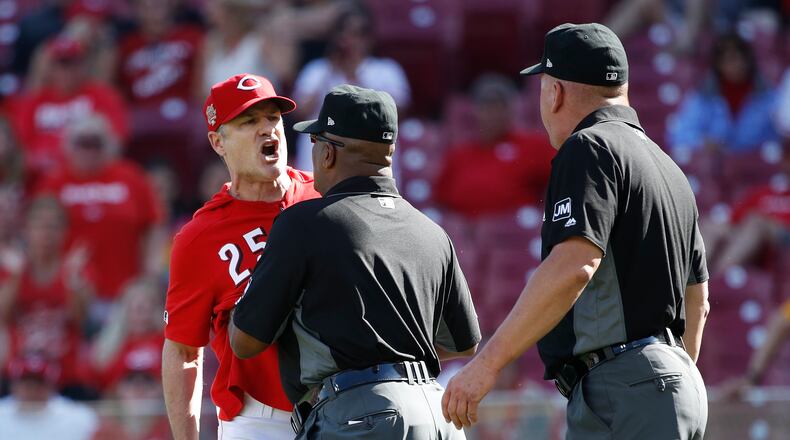»RELATED: Sonny Gray ‘can’t wait’ for All-Star experience
He answers question in a monotone and never embellishes. He never brings up his own playing career, although it was solid. He never compares anything that happens to anything that happened during his playing days, never talks about guys he played with and games in which he played.
When Dusty Baker managed the Reds, he regaled the media daily with tales of his playing days and his personal relationship with Hank Aaron and his respect for singers Bob Dylan and Bob Marley and his love of fine wine and dining.
David Bell? Ask a question, get answer. No less, no more.
»ARCHDEACON: Baseball and race -- a living history
So who is that guy on the field, the one who has been ejected six times by umpires in the first half of the season? It is tied for the most ejections for a rookie manager in history and the season is barely half over.
Bell, though, is one behind Detroit manager Ron Gardenhire for most by any manager this season. And he is a long way from Bobby Cox’s all-time record of 161 ejections (including postseason) as manager of the Atlanta Braves and Toronto Blue Jays. Nor will Bell ever duplicate former Baltimore Orioles manager Earl Weaver of getting ejected from both games of a doubleheader three times.
But what’s up with this mild-mannered Reds manager?
When asked if there was a magic word, a word you can’t say to an umpire without getting ejected, Bell smiled and said, “I think there are a lot of them. Which I’ve discovered,”
Asked if he is surprised by his number of ejections, Bell said, “I haven’t looked to much into it. Each situation has been so different.
“You can look at the number, but it is never something I set out to do,” he added. “You want to avoid that at all costs. Truly, each one has been different, happened for different circumstances. You put them together and it is a significant number, but to me each one was its own story.”
Bell paused to think through his answer and said, “There is no question it is something I want to avoid at all costs. I also, as a manager, feel a responsibility to our players. You want to handle it the best way you can and sometimes it leads to an ejection.
“But my job is to be in the dugout, not to get ejected,” he said. “You always look as to how you can handle things better. Every day there are things you can learn to do better. Maybe by dissecting each of those ejections there is something I can take from them. Overall, though, I have handled them the best way I possible can.”
It looked as if he might get No. 7 early this week during an extra-inning game against Milwaukee. Through pinch-hitters and double switches, both Bell and Brewers manager Craig Counsell were out of position players.
Eugenio Suarez was called out on strikes and reacted with some salty words toward umpire Chad Fairchild. Knowing he couldn’t lose Suarez, Bell raced onto the field to push Suarez away and say something to Fairchild.
Managers are not permitted to argue balls and strikes calls and if they do they are usually ejected. Fairchild, though, let Bell have a short say and didn’t toss him.
“That was a strategic move and soon as I got out there Geno already had said what he said and was finished,” said Bell. “Chad did a good job of understanding the situation. He knew we were out of players. At some point he would have to do what he had to do, but it never got close to that point.”
Asked about his seemingly different personalities in dealing with the media and dealing with umpires, Bell said, “When you care about doing the best you can, you try not to be emotional, try not to let emotions get the best of you that lead to bad decisions. Sometimes to do the best job you can it takes a level of passion and emotion.”
Bell makes it clear he is not anti-umpire, holds no grudges.
“I certainly respect them and I have a lot of respect for what they do, the difficulty of their job,” he said. “There is no doubt about that. For me it is all about doing the best job for my team.”
About the Author
